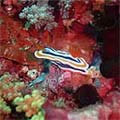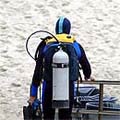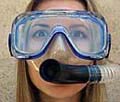« More thoughts on caves | Main | Some things you'd rather not know »
February 9, 2007
Diving safety
Pretty much ever since I took up scuba, I've been thinking of how safe it is. It's not a primary consideration, but the thought pops up and I never know when. My then ten-year-old son was quite concerned when he learned I was going to dive at Devil's Den, though I am sure it was the "devil" part that scared him and not so much the diving. The diving certification organizations, and particularly PADI, go out of their way to paint scuba diving as a perfectly safe, relaxing, and wonderful experience. Many diving books point out the exemplarily low incidence of diving accidents and deaths and compare it to numerous other activities with much higher accident rates. Even fairly scientific diving literature likes to point at diving safety and pull up numbers showing that the percentage of divers who contract the dreaded bends, decompression sickness, is extremely small. And when you look at the numbers, the sport of scuba diving indeed looks safe.
I think I read somewhere that most accidents occur in the bathroom of one's own home, but they are usually not fatal. The number of people killed in automobile accidents each year, on the other hand, is staggering, almost 50,000 every year, making up for almost half of all accidental deaths. Flying would seem to be more dangerous, but the chance of dying in an airplane crash is infinitely smaller, something like 200 a year. Unfortunately, that number is uncomfortably close to the roughly 150 people who die every year in the US from/while diving. But what does this really mean? The rate is about five deaths per million dives. So the chance is one in every 200,000 dives. Even Chuck, my PADI dive instructor with his 11,000 dives would have to go through almost 20 lifetimes of such diving until, statistically, his number is up. Last I checked, Chuck was fine. On the other hand, in February of 2007, state officials in California suspended the operations of an elite dive team after two very experienced divers with high quality equipment died during what should have been routine maintenance in the California aqueducts.
When scubadivinginfo.com was started, I set up Google alerts to send me emails with diving news, using the keyword "scuba." I have been getting them ever since, and a disconcerting number are about diving accidents from all over the world. In the beginning I occasionally reported on some of them in the news section of the website. This resulted in a bit of criticism from some who felt a scuba site should be all positive, and not point out the dark side. I thought about that for a long time. I did not want for scubadiverinfo.com to simply be a diving cheerleading site. If there are dangers, I wanted to point those out as well. In the end we decided to drop most accident reports. Not because I felt they were downers and needed to be withheld from site visitors, but because diving accidents seem to generate far more publicity than other "more common" deaths. As a result, virtually every scuba accident is reported whereas casualties in other areas of life are much less prominently featured. So putting up a news item every time I get a Google report would indeed distort things and paint a gloomy picture. Hey, statistically diving is much safer than skiing or riding a snow mobile. Yet, you rarely ever read chiding reports of skiing or snowmobile fatalities.
Maybe thinking of diving safety is simply in the nature of the sport. Almost anywhere else you can bail when things get hairy. That's not an option when you're 100 feet underwater. If you run out of air, things get desperate rather quickly. Sure, we all learn various ways to handle out-of-air situations, from "controlled ascents" to using secondary air sources from a buddy's system to buddy breathing and so on. But that assumes a diver won't panic and bolt for the surface, which in itself can have nasty consequences. Air embolisms, and all sorts of other decompression illnesses. There's just so much that can go wrong. And when it does, you're in an environment essentially foreign to man. Sure, we all begin life in a womb, in liquid, but after that we're surface dwellers and submerging means entering a hostile world.
Then there are all the various things that can go wrong. Underwater almost anything can become toxic. Life-giving oxygen? We need it, but too little and you pass out and drown. Too much and there's the danger of oxygen toxicity that leads to convulsions, and you drown. Nitrogen? An inert gas, but one that not only seeps into your system and tissues as you go deeper and thus must be carefully expelled again as you go back to the surface, but also one that becomes narcotic at depth. Nitrogen narcosis has been romantically described as "rapture of the deep" and some divers have even written about enjoying it, but it can become deadly. The minute traces of carbon monoxide in the air that hardly ever harm us on the surface? Well, increased pressure underwater means carbon monoxide partial concentration can become deadly. Carbon dioxide? That's what makes us know when we need to breathe. Get that out of whack and you can simply pass out from a lack of oxygen and drown. Not a nice picture. And that's not even going into all that can happen when you go technical and start using alternate gas mixtures.
And there's more. I generally view every sports as inherently healthy. Engaging in outdoor recreational activity means exercise, fresh air, movement, the works. Yet, the more I read, the more it seems that diving really isn't the best thing for one's health. Divers often report unusual fatigue. Those engaging in extreme diving may take days or weeks to recover from a single deep dive. Carol reports that using nitrox helps her emerge from dives much fresher and feeling much better. Yet, I've also come across rather disconcerting studies that seem to indicate that the higher partial pressure of oxygen during a dive is inherently bad for the human cardiovascular system, deteriorating its protective cell linings and resulting in other temporary and permanent damage.
I won't let any of that stop me. I intend to follow all the rules, plan my dives, never do anything stupid, and never dive beyond my training. Yet, as a curious soul I have also come across the dangers. Maybe that is just inevitable. One of the things I often think about is how no one is ever more than a few words away from absolute and total disaster, every day. Yell "fire" in a crowded theater. Or "bomb" in an airplane or airport. Tell your boss to kiss off, a teller that you're holding up the bank, or threaten a police officer. Or say certain things to a spouse, friend or relative. Life as you knew it is over in an instant. Things are simply dangerous, so why should it be any different with diving?
Posted by conradb212 at February 9, 2007 11:07 PM








